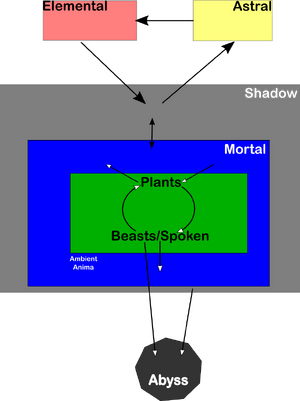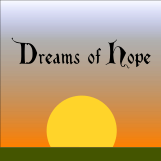Source of Magic
The energy that fuels magic and other "supernatural" events is the same energy that makes up the souls of living beings. Anima.
Anima Cycles
Anima is formed within a soul when the soul creates new memories, grows, absorbs information--in general, through the process of creation. When a living thing dies, its spark (the portion that creates anima) passes into the Shadows (for intelligent beings) or back into the Mortal plane (for plants and lower animals). That energy is pumped up into the Astral by the Great Mechanism and passed among the gods and used to maintain the universe itself, with a large portion passing into the elemental planes and being used to continue the natural cycles of the Dream (such as replenishing the air and water, rebuilding the minerals and rocks, and keeping the earth-fire and Eua burning).
Some of the anima created is lost into the Abyss or consumed by great workings (great acts of creation, usually involving artifacts). Most magic does not consume anima, but creating matter from "nothing" does, as that is the source of the matter. In extreme cases (such as the cleansing of North Ithemba in 211 AC, the local ambient anima density is severely depleted by such great acts, diminishing the power of magic temporarily.
Instead, most "magic" (fantastic abilities) works by altering the aspects of the anima. Since all matter and energy is comprised, at its core, of anima, aspects are the part that distinguishes fire from water, the flesh of a bird from a stone, etc. Aspects can be altered and shifted by magic either temporarily or permanently. But in general, externally-imposed resonant transformations of aspects fades when the resonance does. But the effects caused by that transformation do not--fires lit by magical fire do not go out, cuts from blades of slashing wind that came from no-where do not automatically heal, etc.
Aspects
Note: this discussion follows the categorization scheme developed in Western Noefra during the 3rd age. Other places and cultures have their own categorization schemes. None of them are fundamental; all of them describe the same underlying properties in different ways.
Aspects can be divided into four Elements, each of which has one of two Characters and one of two Solidities. There is anima that is so strongly Characterized that the Elemental nature is irrelevant. Thus, there are 16 aspects, but at the ends they all merge into two possibilities. All matter can be categorized as having different admixtures of each of these aspects, although scholars generally divide things into a few groups depending on whether they contain only one Character of a given Element (regular matter) or contain parts of both Characters of a given element (Paradoxical).

Magic vs Fantastic Abilities
Generally, the term "magic" is reserved for abilities that form resonant patterns in the ambient anima, like spells and magic items. But all "fantastic abilities" (anything that would not be possible on Earth, nor are truly normal among the people of Quartus) are also fueled by anima. But the forms and properties of these fantastic abilities differ.
Spells
Living spell-casters accumulate anima in knots in their souls. These knots come in varying strengths--two lower level "slots" do not equal one higher slot. These knots are used to fuel patterned resonances with the ambient anima--these patterned resonances are spells. Some spells (cantrips) can be cast solely with the caster's mental energy and do not use up these knots. Without special training, these slots reform over time but require a night's rest to be usable again. There are rumors of some who can force energy into their knots faster, but those are not widespread. Some casters can cast certain spells by relying on ambient anima (and thus without using a knot or slot) at the cost of significantly increasing the time required, making them act much more like rituals (described below).
The number of spell-slots available to a caster depend on their level of soul-growth. For many (if not most) people, the ability to cast a single (or at most two) of the lowest-powered spells is the maximum they will ever attain. Some grow quickly, some more slowly. Those who focus on spell-casting tend to grow faster than those who split their efforts with martial pursuits.
While all spell-casters gain power from the ambient anima, the source of the spells (that is, the patterns through which they manipulate reality) differs. Those differences are described in the Varieties of Magic. The primary sources are
- Harmonic magic is the use of rhythm and music to manipulate anima. This is most associated with bards, common chants and Leviathan.
- Arcane magic is direct pattern-based symbolic manipulation of anima, associated most with the gwerin and with wizards and the more magically-oriented fighters and rogues.
- Channeled magic is sourced from another creature, where the caster acts as the channel. Associated most with druids and clerics, as well as rangers.
- Personal magic comes from within, often via birth or revelation. The casters rarely can articulate how they cast, and their magic is tied to their state of mind. Most associated with paladins, sorcerers, and warlocks.
For most mortals, casting spells requires components: gestures, material items, and/or patterned sounds (usually in the form of arcane-sounding phrases). These are not intrinsic to the spell itself; they're merely devices used as crutches to compensate for the limits of mortality. The truly strong beings, such as dragons, angels, demons, etc. generally require fewer such components; those beings with magic in their blood also rarely require components. The exact components are fairly standardized due to a scientific study of magic during the Old Western Empire period. Other parts of the world use different components. Verbal components show the most variation--the exact words aren't important. The cadence, rhythm, intonation, volume, and other sonic factors are what matter. Different schools (especially of wizardry) often obfuscate the truly important parts, and every caster does things slightly differently. They're more mnemonic devices than fundamental facts of reality.
Rituals
Most magic use on Quartus is not really in the form of spells, those discrete, individual patterns of resonant anima. Instead, it's in the form of rituals. With ritual work, the energy needed is gathered by the participants and shared through complex workings; the patterns are formed by the participants acting collectively. Single practitioners can perform rituals, with their ritual objects acting as foci. The oldest and most powerful rituals involve sacrifice of a living being, voluntarily or not. See Blood Magic for more details there. Often, blood magic is used to spike the power or shorten the time needed, as the concentration of anima in a living being is huge.
Rituals take much longer than spells to perform. For those spells that can be ritualized, it generally takes 10x as long to perform the ritual as to cast the spell. During this time, the caster (or casters) are vulnerable to interruption--they must maintain their concentration throughout. One benefit of larger rituals is that a practiced group can substitute members seamlessly during the ritual, allowing the longer rituals (some lasting weeks of constant work) to go on without killing the participants.
Rituals require ritual foci--implements, stories, chants, objects that all have relevance to the caster--like spell-casting components, these foci are more for the sake of the caster than for anything fundamental about the universe. Common foci include candles, diagrams, ritual knives, parts of creatures, gemstones, and chants.
Unlike casting spells, even those without "knots" can participate in ritual work. In general, rituals scale with the number of participants more than with the quality of participant--this is why cults prefer many disposable members rather than fewer, more powerful (and thus more dangerous) ones. This is also why village rituals work so well, despite not having anyone of any strength. Quantity has a quality all of its own, after all.
Items
Since all magic is mediated through souls, permanent magical items that can actively manipulate anima (cast spells or spell-like effects without needing to be recharged) are quite rare. In fact, some theories suggest that imbuing an item with enough anima to persist and gather anima by itself would by necessity involve the creation of a soul (and thus would make the item intelligent to one degree or another). Temporary magical items such as scrolls, potions, or spellstones (stones that can be charged to unleash magical energies) exist but the creation of these requires an intelligent being to contribute anima and, once used, are rendered inert or destroyed. Items with charges draw on the ebb and flow of the ambient anima to recharge, usually once per day at a fixed time (often midnight or dawn). Creating items generally involves a key item or location associated with the effect desired.
Some more powerful items require the active involvement of a suitable host for their power to be realized--they interface with the nimbus of the wielder and resonate with their souls. Due to this resonance, it is impossible for normal mortals to attune (become bonded to) more than 3 such items simultaneously, and attuning to an item requires time (as does breaking the attunement).
At the current time, items of Uncommon rarity and below can generally be created (given the key items) in the Federated Nations; those of Rare rarity and above remain the source of adventuring wealth. Imperial Legacy is the Adventuring Company most devoted to magic item creation and research. Potions and other consumables are easier to make, with occasional Rare-quality consumables going on the market for connected buyers. Generally, unless you're a member of Imperial Legacy, buying and selling magic items other than consumables is difficult if not impossible.
Innate and Learned Abilities
Dragons fly, when their wings are not nearly large enough to carry them. And they breathe energy. These are examples of innate fantastic abilities. There are many others--most monstrosity-class creatures (defined as those with fantastic abilities in a neatly-circular fashion) rely on these abilities. But many adventurers and other powerful people also use these abilities. They cannot be taught, they can only be gained by personal quirks and intrinsic nature. Most often, these are inward-directed and modify the wielder's own body, enhancing it with anima drawn from the environment. Often, these abilities are not consciously controlled--they merely are. As an example, a barbarian draws in power mediated by his emotional state, enhancing his own body to deflect blows and strike harder.
Other abilities can be learned by someone of sufficient mastery. A fighter blurs into motion, striking like a whirlwind for a brief moment. Another fighter calls out a command and his allies find an opportunity to strike yet again. A rogue wraps himself in shadow for a brief instant, shunting the force of a fireball into liminal space and coming out unharmed. Another rogue climbs as if his fingers were claws. One common characteristic is that these abilities can't be used continuously--they deplete the user's internal reserves. They're not magic, and they can't be countered by dispelling magics; they're merely effects that stretch the boundaries of the possible.
